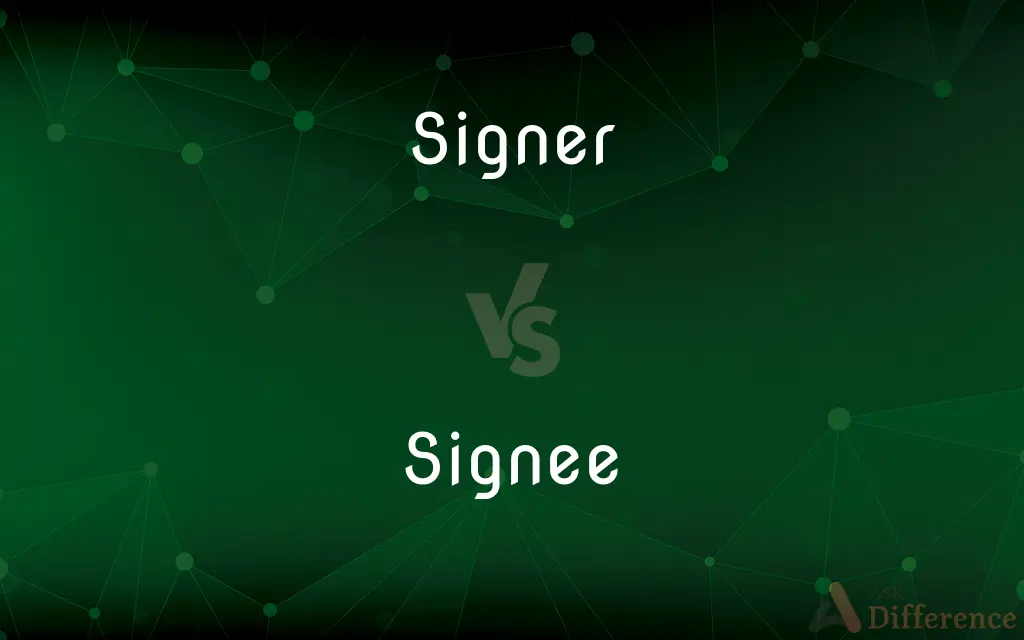Signer vs. Signee — What's the Difference?
By Tayyaba Rehman — Updated on November 4, 2023
The signer is the one who writes their signature, while the signee is the individual to whom the signature is directed or who receives the document.

Difference Between Signer and Signee
Table of Contents
ADVERTISEMENT
Key Differences
A signer is an individual who affixes their signature to a document, indicating agreement, acknowledgment, or obligation. It is an active role, involving the person who holds the pen. In contrast, the signee is typically the party whose name appears on a contract or agreement as the recipient or beneficiary of the signed document. While the signer is the one performing the act of signing, the signee is often on the receiving end of that action.
In legal documents, the signer is the person who is executing or ratifying the document, and this act may be witnessed or notarized depending on the document’s requirements. The signee, however, may not always be present at the time of signing and does not necessarily sign the document themselves. The signer's role is to provide authenticity, whereas the signee's role is often to benefit from or be bound by the signer's action.
Within various contexts, the signer is the initiator of a signature-based transaction or communication. This could be an authorizing official, a celebrity giving an autograph, or an individual endorsing a check. The signee, however, may be an organization accepting the official's order, a fan receiving the autograph, or a bank acknowledging the endorsement on a check. The signer's authority or intent is transferred through their signature to the signee.
The signer's signature can have legal implications, such as binding them to the terms of a contract or confirming their approval of a document’s contents. The signee, on the other hand, is often the entity that requires this legal acknowledgment, such as a company receiving a signed contract from an employee. The signer's action is a commitment, while the signee’s part is typically to enforce or accept that commitment.
In cases where a signer is required to sign in the presence of a witness, the role of the signer is clear—they are the individual whose signature is being witnessed. The signee in this situation may not be involved in the signing process at all but is instead the person or entity for whom the signature is intended to have effect. The signer's signature is their personal mark, and the signee is the party that relies on the validity of that mark.
ADVERTISEMENT
Comparison Chart
Role in Signing
Actively signs a document
Receives or is named in the document
Legal Obligation
May be legally bound by their signature
May enforce or benefit from the signature
Presence during Signing
Must be present to sign
Not required to be present
Action
Provides a signature
Often the intended recipient of the signature
Example
A celebrity autographing a poster
The fan who receives the autographed poster
Compare with Definitions
Signer
A person who signs a letter or document.
The signer of the letter ensured it was delivered personally.
Signee
The individual named in a signature.
The signee of the contract was pleased with the terms.
Signer
A party endorsing a financial instrument.
The signer on the back of the check was the payee.
Signee
A beneficiary of a signed agreement.
The signee was granted power of attorney.
Signer
Something that suggests the presence or existence of a fact, condition, or quality
A high temperature is a sign of fever.
Signee
The end recipient of a legal signature.
The signee of the will was the eldest child.
Signer
An act or gesture used to convey an idea, a desire, information, or a command
Gave the go-ahead sign.
Signee
A person receiving the signed document.
The signee received the deed to the new house.
Signer
Sign language.
Signee
An entity for whom a signature is intended.
The signee of the memorandum was the company's CEO.
Signer
A displayed structure bearing lettering or symbols, used to identify or advertise a place of business
A motel with a flashing neon sign outside.
Signee
One who has signed a document, such as a contract or petition.
Signer
A posted notice bearing a designation, direction, or command
An EXIT sign above a door.
A traffic sign.
Signee
One who signs a contract, especially in athletic contexts
Our team has landed some great signees in this draft.
Signer
A conventional figure or device that stands for a word, phrase, or operation; a symbol, as in mathematics or in musical notation.
Signer
Pl. sign An indicator, such as a dropping or footprint, of the trail of an animal
Looking for deer sign.
Signer
A trace or vestige
No sign of life.
Signer
A portentous incident or event; a presage
Took the eclipse as a sign from God.
Signer
(Medicine) An objective finding, usually detected on physical examination, from a laboratory test, or on an x-ray, that indicates the presence of abnormality or disease.
Signer
One of the 12 divisions of the zodiac, each named for a constellation and represented by a symbol.
Signer
To affix one's signature to
Signed the letter.
Signer
To write (one's signature)
Signed her name to the contract.
Signer
To approve or ratify (a document) by affixing a signature, seal, or other mark
Sign a bill into law.
Signer
To hire or engage by obtaining a signature on a contract
Signed a rookie pitcher for next season.
Sign up actors for a tour.
Signer
To relinquish or transfer title to by signature
Signed away all her claims to the estate.
Signer
To provide with a sign or signs
Sign a new highway.
Signer
To communicate with a sign or signs
Signed his approval with a nod.
Signer
To express (a word or thought, for example) in a sign language
Signed her reply to the question.
Signer
To consecrate with the sign of the cross.
Signer
To make a sign or signs; signal.
Signer
To communicate in a sign language.
Signer
To write one's signature.
Signer
One who signs something.
John Hancock is a famous signer of the Declaration of Independence.
Signer
One who uses sign language.
Signer
One who signs or subscribes his name; as, a memorial with a hundred signers.
Signer
Someone who can use sign language to communicate
Signer
Someone who signs and is bound by a document
Signer
One who writes their signature.
The signer of the check was required to show ID.
Signer
An individual executing a document.
The signer of the contract read every page carefully.
Signer
An artist or celebrity giving an autograph.
The signer was surrounded by fans at the premiere.
Common Curiosities
Does the signer have legal responsibilities?
Yes, the signer may be legally bound by their signature.
Can the signer and signee be the same person?
Yes, in some cases, the signer can also be the signee, such as when self-signing a document.
What is a signee?
A signee is the individual to whom the signature is directed or who receives the document.
Is a signee always a person?
No, a signee can also be an organization or legal entity.
What is a signer?
A signer is a person who writes their signature on a document.
Does the signee need to witness the signing?
No, the signee does not need to witness the signing unless specifically required by the document.
What responsibilities does the signee have?
The signee is typically responsible for enforcing or accepting the terms indicated by the signer’s signature.
Can electronic signatures have signers and signees?
Yes, electronic signatures still involve signers and signees with the same roles as physical signatures.
What happens if a signer’s signature is forged?
If a signature is forged, the document may be invalid, and legal action can be taken.
Can there be multiple signers for one signee?
Yes, documents can have multiple signers with a single signee, such as in a petition.
Must the signer always be present to sign?
Yes, the act of signing requires the signer to be physically present to apply their signature.
What is the role of a notary in regards to a signer?
A notary public verifies the identity of the signer and witnesses the signing to deter fraud.
Does the signee have to accept a signature?
Yes, for the document to be effective, the signee must accept the signature.
Who is important in the legality of a signature, the signer or the signee?
Both are important, but the signer's act is crucial for the signature’s legality.
Can a signer retract their signature?
Depending on the situation, a signer may retract their signature before it is accepted by the signee.
Share Your Discovery

Previous Comparison
Sulfur vs. Sulfate
Next Comparison
Residential vs. ResidenceAuthor Spotlight
Written by
Tayyaba RehmanTayyaba Rehman is a distinguished writer, currently serving as a primary contributor to askdifference.com. As a researcher in semantics and etymology, Tayyaba's passion for the complexity of languages and their distinctions has found a perfect home on the platform. Tayyaba delves into the intricacies of language, distinguishing between commonly confused words and phrases, thereby providing clarity for readers worldwide.
















































